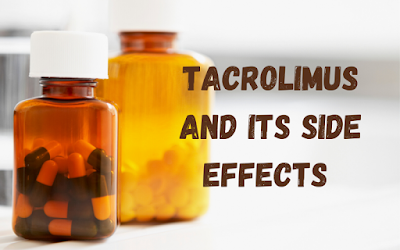Tacrolimus is an immunosuppressive drug that is used to suppress the immune system to avoid organ rejection mainly liver, kidney, or heart. It is also used in the treatment of T cell-mediated diseases such as psoriasis, eczema, exacerbation of minimal change disease, severe refractory uveitis, and Kimura's disease.
Tacrolimus work by inhibiting the activity of calcineurin that is involved in the production of interleukin-2. Interleukin-2 helps in the proliferation and development of t cells which are the key function to strengthen the immune system.
Tacrolimus is recommended in the patient having liver for heart transplantation as sirolimus use is not approved in such cases.
Dosage and administration:
Tacrolimus is available in two forms:- Capsule: 0.5 mg, 1 mg and 5 mg
- Injection: 5 mg/mL ( containing dehydrated and alcohol hydrogenated castor oil) Tacrolimus injection before use must be diluted with 5% dextrose injection for 0.9% sodium chloride injection.
When the patient is injected with tacrolimus injection a constant Observation for at least 30 minutes should be kept off the infusion. if any symptoms of anaphylaxis occur then the infusion is stopped immediately and an aqueous solution of epinephrine is provided.
The dosage of tacrolimus capsules depends upon body weight, age, and type of transplantation.
The oral administration of tacrolimus should be taken with or without food. However, the availability of food may degrade the performance of tacrolimus.
Firstly the dose of tacrolimus is given in capsule form. When the patient is unable to take oral administration of tacrolimus then only tacrolimus is intravenously injected into the patient body. With the injection of tacrolimus, the whole body's blood transfusion is monitored.
Tacrolimus should not be injected into pregnant women as it may cause fetal damage or birth abnormality.
Side effects of Tacrolimus:
Side effects in cases of different organ transplantation are mentioned below:- Kidney transplantation: The most common side effects are hypertension, constipation, diarrhoea, headache, abdominal pain, Insomnia, urinary tract infection, hyperlipidemia, hypokalemia anaemia, hypomagnesemia, infection.
- Liver transplant: some adverse reactions of tacrolimus 1 mg are headache diarrhoea hypertension abdominal pain nausea abnormal knee renal function anaemia Insomnia fever pain paraesthesia hypokalemia hyperglycemia hypomagnesemia.
- Heart transplant: some common side effects are hyperglycemia, Diabetes mellitus, hypertension, abnormal renal function, leukopenia, bronchitis, hyperglycemia
- Some other severe side effects of tacrolimus 0.5mg are:
- Polyomavirus Infections: sometimes fatal outcomes such as polyoma virus-associated nephropathy(PVAN).
- Cytomegalovirus (CMV) Infections: Enhanced danger of CMV viremia and disease.
- Diabetes after transplant: blood glucose level is monitored constantly
- Neurotoxicity: acute or chronic nerve problem exists.
- Neurotoxicity: some neurologic abnormality is found such as the risk of posterior reversible encephalopathy syndrome.
- Hypokalemia: potassium level is monitored carefully
- Hypertension: may occur due to drug-drug interaction patients may require antihypertensive drugs.
- Myocardial Hypertrophy: May leads to dosage discontinuation or reduction.
- Pure red cell aphasia: discontinuation of tacrolimus is recommended.
- Immunization: use of live vaccines are avoided.
Drug interaction:
The interaction of tacrolimus 5mg drug with other medications are listed below:
- Mycophenolic Acid Products: Can increase MPA exposure
- Nelfinavir and Grapefruit Juice: Increased tacrolimus concentrations.
- CYP3A Inhibitors: Increased tacrolimus concentration.
- CYP3A4 Inducers: Decreased tacrolimus concentrations
Tacrolimus uses are contraindicated with other medications as it is not used with a combination of other medications having the same substitute or same constituent of tacrolimus.
The cost of tacrolimus is quite decent and affordable. A respective patient can purchase it through any legitimate pharmaceutical company.
Read:- About Mycophenolate Mofetil a transplant medication

I was diagnosed as HEPATITIS B carrier in 2013 with fibrosis of the
ReplyDeleteliver already present. I started on antiviral medications which
reduced the viral load initially. After a couple of years the virus
became resistant. I started on HEPATITIS B Herbal treatment from
ULTIMATE LIFE CLINIC (www.ultimatelifeclinic.com) in March, 2020. Their
treatment totally reversed the virus. I did another blood test after
the 6 months long treatment and tested negative to the virus. Amazing
treatment! This treatment is a breakthrough for all HBV carriers.